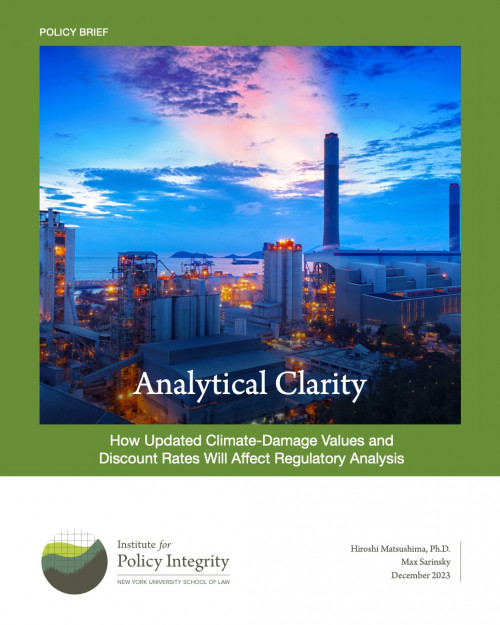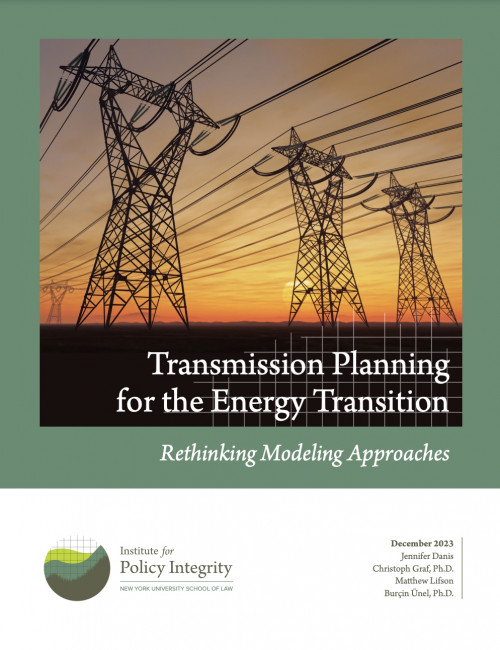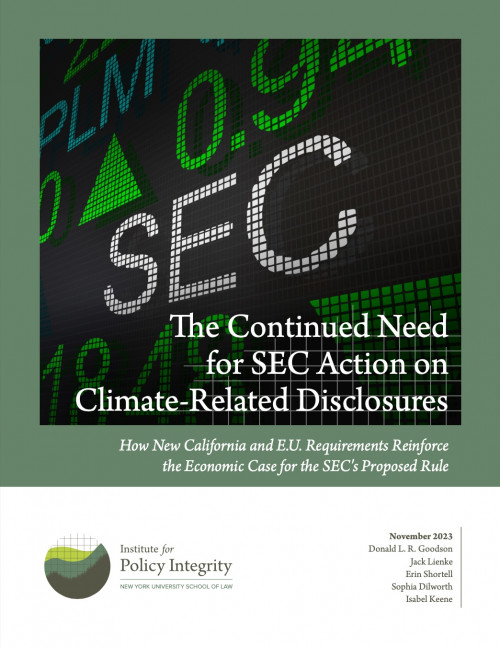-
Comments to EPA on Proposed Regulation of Trichloroethylene (TCE)
In October, EPA issued proposed restrictions on the manufacture, processing, and distribution of a chemical called trichloroethylene (TCE). We argue in comments that aspects of the agency’s Economic Analysis of the proposed restrictions could be clarified or expanded upon to better inform policymakers and the broader public about the benefits of ending TCE use.
-
Supplemental Comments to NHTSA on Proposed Vehicle Fuel-Economy Rule
In August, the National Highway Traffic Safety Administration (NHTSA) proposed to strengthen vehicle fuel-economy standards. Since then, the Environmental Protection Agency has finalized its update to the social cost of greenhouse gases and the Office of Management and Budget has finalized its revisions to Circular A-4. In light of these updates, we submitted a supplemental comment letter reasserting our call for NHTSA to assess regulatory impacts using the best available economics.
-
Supplemental Comments to CEQ on Climate Change Guidance
Earlier this year, the Council of Environmental Quality (CEQ) published interim guidance on analyzing climate change effects under the National Environmental Policy Act in which it endorsed using the social cost of carbon in environmental analysis. In this supplemental comment letter, we suggest that CEQ specifically endorse the Environmental Protection Agency’s newly-updated climate-damage values when it finalizes the interim guidance.
-
Policy Integrity Scholarship and Advocacy Shapes EPA’s New Climate Damage Valuations
On December 2nd, EPA released a new methane regulation that includes final updated values for the social cost of greenhouse gas metrics. The updated metrics align with many of the recommendations Policy Integrity made in our comments on the draft values, and our scholarship and analysis were cited heavily in the associated federal documentation.
-

Analytical Clarity
How Updated Climate-Damage Values and Discount Rates Will Affect Regulatory Analysis
Recently completed and draft guidance is ushering in updated practices for federal benefit-cost analysis. This policy brief examines the impact of two of the most significant upcoming changes: to the discount rate and the social cost of greenhouse gases.
-

Transmission Planning for the Energy Transition
Rethinking Modeling Approaches
This report examines the critical role of modeling details and assumptions that transmission planners frequently ignore. We first provide an overview of the wide array of choices planners have when designing traditional transmission planning models. We then discuss how planners need to rethink these choices to account for the rapidly evolving energy system and the additional uncertainties climate change brings. Finally, we present a modeling case study to show how important these modeling choices could be for transmission outcomes.
-

The Continued Need for SEC Action on Climate-Related Disclosures
How New California and E.U. Requirements Reinforce the Economic Case for the SEC’s Proposed Rule
On March 21, 2022, the Securities and Exchange Commission (SEC) proposed a rule that would require SEC registrants (both domestic and foreign) to provide climate-related disclosures in certain SEC filings. Since the release of the SEC Proposal in March 2022, other jurisdictions, including California and the European Union, have adopted climate-related disclosure regimes. Like many federal rules, the SEC Proposal included an assessment of its costs and benefits. This report examines how the California and E.U. disclosure regimes may affect the baseline for that cost-benefit analysis and, consequently, the SEC’s assessment of the incremental costs and benefits of its proposal. Overall, we find that the new disclosure regimes do not undermine the economic case for the SEC Proposal; if anything, they bolster it.
-
Comments to EPA on the Proposal to Limit Emissions from Reclassified Major Sources of Air Toxics
In November 2020, EPA finalized a rule withdrawing the “Once-in, Always-in” Policy, under which facilities that are “major sources” of emissions at the first compliance date for the applicable standard must comply permanently with the requirements for a major source. This 2020 Rule allows major sources of toxic air pollution to reclassify as area sources, which are subject to less stringent or no emission control requirements. The 2020 Rule therefore creates the potential for very large increases in toxic air pollution. In September 2023, EPA proposed new safeguards to prevent increased emissions from sources that reclassify and restores federal enforceability requirements for potential to emit limits. We submitted comments on the analysis underlying the proposed new safeguards.
-
Policy Integrity Work Shapes Long-Overdue Updates to Federal Regulatory Guidance
On November 9th, the White House finalized its revision of Circular A-4, the primary guidance on how federal agencies should assess the costs and benefits of regulations. This document plays a critical role in federal policymaking, and it had not been updated in two decades. The new guidance represents a major improvement over current practice and incorporates numerous changes that Policy Integrity has long recommended.
-
Comments to PHMSA on Proposed Pipeline Safety Initiatives
In September 2023, the Pipeline and Hazardous Materials Safety Administration (PHMSA) proposed a regulation to improve the safety of certain gas pipelines. The standards include a suite of reforms to help prevent incidents like the catastrophic 2018 gas pipeline explosions in Merrimack Valley, Massachusetts. In a comment letter, we explain that, while the Proposed Rule and its accompanying regulatory impact analysis are well grounded in applicable statutes and guidance, PHMSA should take further steps to bolster its analysis.





